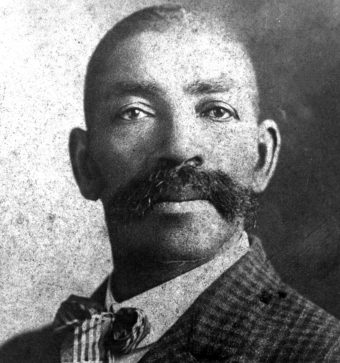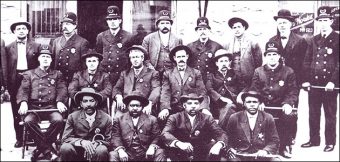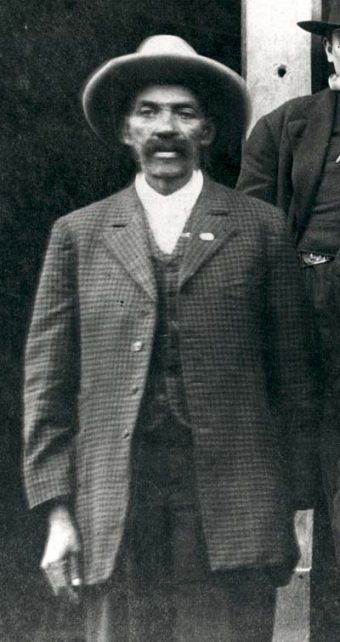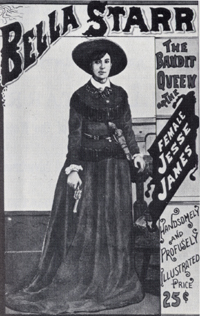The Remarkable Bass Reeves
 While historians posit that the Wild West was nowhere near as wild as Hollywood would have you believe, it was a place where certain lawmen forged reputations as legendary heroes in their pursuit of outlaws. (Although in some cases, such as Wyatt Earp, the lawmen were little better than some of the criminals, see: Wyatt Earp – The Great American… Villain?) As for “The Indomitable Marshal” Bass Reeves, he was a former slave turned Deputy Marshal who captured some 3000 outlaws in his long and storied career.
While historians posit that the Wild West was nowhere near as wild as Hollywood would have you believe, it was a place where certain lawmen forged reputations as legendary heroes in their pursuit of outlaws. (Although in some cases, such as Wyatt Earp, the lawmen were little better than some of the criminals, see: Wyatt Earp – The Great American… Villain?) As for “The Indomitable Marshal” Bass Reeves, he was a former slave turned Deputy Marshal who captured some 3000 outlaws in his long and storied career.
Born in 1838 somewhere in Arkansas, Reeves spent his childhood as the slave of State legislator William Steele Reeves. Little is known about Reeves’ youth and he seldom talked about it as an adult, but we know at various times he served as a water boy, a blacksmith assistant, and eventually as his master’s companion, considered an “upper servant” position that allowed Bass and his family to eat “at the house table”. With the death of William Reeves, Bass became the slave of one of William’s sons, George Reeves, a colonel in the Confederate Army during the Civil War. (And if you’re curious, see: Why is Colonel Pronounced “Kernel”?)
During his time with the colonel, Reeves became an excellent marksman with a hunting rifle, reportedly well surpassing the colonel himself. He was so good, in fact, that George Reeves started entering Bass into various turkey shoot competitions, some of which he won. According to a newspaper interview given by Bass late in his life, he primarily functioned as the colonel’s valet, bodyguard, coachman, and butler, and Reeves even claimed he accompanied the colonel into battle during the Civil War.
However, ultimately an argument over a card game with the colonel escalated to Reeves beating him up and then fleeing to freedom in Indian Territory. There, Reeves was welcomed by the so-called “Five Civilized Tribes” (Cherokee, Choctaw, Chickasaw, Creek and Seminole), spending his time on the run learning their languages and customs.
After the war, Reeves moved to Van Buren, Arkansas, becoming a successful rancher and occasional guide and scout for marshals into Indian Territory. He also added another feather to his cap and became a doting family man, marrying a Texas girl, Nellie Jennie, with whom he fathered nearly a dozen children.
Reeves would have likely lived out the rest of his years as a rancher if not for a concerted effort from a recently appointed judge called Isaac C. Parker to clean up the Western District of Arkansas in 1875. You see, since the end of the Civil War, Western Arkansas had become something of a hotbed for crime due to its close proximity to the same Indian Territory Reeves had lived in during the latter part of the war- a region many lawmen tended to steer clear of. The result was that this territory made for a great hide-out for outlaws seeking to escape justice.
 Judge Parker, keen to curb the growing lawlessness in the over 75,000 square mile territory, appointed a man called James F. Fagan as a U.S. Marshal for West Arkansas and tasked him with finding 200 suitable deputies to help bring law and order to the region.
Judge Parker, keen to curb the growing lawlessness in the over 75,000 square mile territory, appointed a man called James F. Fagan as a U.S. Marshal for West Arkansas and tasked him with finding 200 suitable deputies to help bring law and order to the region.
Bass being a crack shot with a rifle (and later with a handgun), being fluent in several Indian languages, knowing the Indian Territory like the back of his hand, and being on good terms with the various tribes that lived there made him a natural choice for a marshal. Despite racial prejudices of the day, Fagan wasted no time deputising Reeves, making him one of the first black Deputy U.S. Marshals in history and famously the first “west of the Mississippi”.
 Before getting to his storied career, we should take a moment to describe Deputy Marshal Bass Reeves. Standing an imposing 6 ft 2 inches tall (at the time the average height for an adult male in the United States was 5 ft 7 inches or about 170 cm) with a magnificent handlebar moustache, and a sly sense of humour, Reeves reputedly possessed incredible strength, eventually could fire his guns with extreme accuracy ambidextrously and took to wearing a giant black stetson and immaculately polished boots when on patrol.
Before getting to his storied career, we should take a moment to describe Deputy Marshal Bass Reeves. Standing an imposing 6 ft 2 inches tall (at the time the average height for an adult male in the United States was 5 ft 7 inches or about 170 cm) with a magnificent handlebar moustache, and a sly sense of humour, Reeves reputedly possessed incredible strength, eventually could fire his guns with extreme accuracy ambidextrously and took to wearing a giant black stetson and immaculately polished boots when on patrol.
After becoming a Deputy, Reeves became nothing short of a legend amongst the cattle rustlers and various other ne’er do wells of the Old West. It was even widely reported in his day, such as in the January 2, 1908 edition of The Daily Admoreite, that “he never failed to bring in a man he went after. He would get them either dead or alive.” Another report stated, “Place a warrant for arrest in his hands and no circumstance can cause him to deviate.” However, this doesn’t appear quite correct. For instance, one report in the Bisbee Daily Review on February 22, 1906 both demonstrates Reeves’ incredible memory and that at least one individual got away:
Deputy Marshal Cordell brought in two prisoners, Barney Fixico and Wild Cat, yesterday, charged with the murder of Billy Cully, a Seminole Light Horseman, on the third of this month… When Wild Cat was put in jail here, one of the deputy marshals, Bass Reeves, recognized him as a man he had arrested once twenty years ago. Reeves arrested him on a murder charge and was taking him to Fort Smith for trial. When they reached the Arkansas river, Wild Cat made his escape. He had not been seen or heard of since, and the officer supposed he was dead until he turned up at the jail here today.
Nevertheless, Reeves became one of the most respected and feared lawmen of the age for his dogged persistence, incorruptible nature, and reputation for being absolutely fearless in any circumstances, with the Oklahoma City Weekly Times-Journal once reporting that “Reeves was never known to show the slightest excitement, under any circumstance. He does not know what fear is.”
Among his countless adventures during his career, include this event reported in the September 4, 1884 edition of the Indian Chieftain,
Bass Reeves on his last trip had an experience that came near cutting short his usefulness and did send one man where he won’t fool with other people’s horses. He had warrants for two men, Frank Buck and John Bruner. While up the Canadian looking for prisoners he came on these men but did not known them. He inquired for other parties whom he was after and Buck and Bruner volunteered to guide him. At noon all parties camped, and while they were getting dinner he noticed Bruner stealthily pulling his pistol. Suspecting something he stepped behind his horse and around to the front of Bruner and grabbed his pistol before he had time to use it, and at the same time pulled his own. Glancing over his shoulder Buck was seen getting out his weapon, when as quick as a flash Reeves, still holding Bruner’s pistol in one hand, threw over his other and shot Buck dead. Bruner was then secured and is now on his way to Fort Smith where he will have to answer to a double charge.
Another famed incident involved Reeves chasing down the three Brunter brothers, who ultimately managed to get the drop on him. It was reported that the men ordered Reeves off his horse at gunpoint and began to gleefully taunt the man who at that point in his career was already known as the “Indomitable Marshal”. Despite their taunts that they were going to kill him, Reeves calmly asked for the date. When the bemused brothers asked why he wanted to know what day it was, Reeves explained that their arrest papers needed to be dated before adding that, dead or alive, they were coming with him.
The outlaws immediately burst out laughing at the threat at which point Reeves grabbed the gun barrel of the nearest brother, pointing it away from himself. At the same time, he drew his own gun as the other two brothers aimed to fire at him. Reeves was faster, managing to kill both before they could shoot him. Reports differ as to what happened to the third brother.
According to the excellent Reeves biography, The Black Badge, written by Judge Paul L. Brady, the first black Federal Administrative Judge in U.S. history and the great-nephew of Bass Reeves, the third brother survived the encounter and was taken into custody. However, other accounts state that as the third brother was firing rounds from his diverted revolver, Reeves jerked it out of his hand and hit him on the head with it. Not apparently meaning to kill him, supposedly the blow to the head nevertheless fractured his skull and he died.
Whatever the case, despite being involved in many shootouts throughout his career, Reeves reportedly never sustained any serious injury while on the job, though according to a January 18, 1910 edition of The Daily Ardmorette, “At different times his hat was shot in two, buttons were shot from his coat, his hat punctured and his bridle reins shot from his hand, but no bullet ever touched his body.”
Nevertheless, there was at least one report we found of Reeves not just getting shot, but killed, in a clearly misinformed February 5, 1891 edition of the Democratic Northwest, in which it states, “Deputy United States Marshal Bass Reeves was shot and killed by a negro outlaw named Christie, at Fort Smith, Arkansas. Christie was being arrested for a murder committed some time ago.”
In one instance in his twilight years, he was even fired upon unexpectedly in an apparent assassination attempt. As reported in the November 15, 1906 edition of The Daily Ardmoreite,
Bass Reeves, a Negro Deputy Marshal, Shot at Near Wybark. Reeves was in his buggy north of Wybark and was driving under a railroad trestle on which the assassin was posted when a six-shooter cracked and a bullet splintered the wood of one of the ties in the trestle directly over his head. He saw the man and returned the fire but the would-be assassin got away and was probably unhurt… Reeves declines to say whom he thinks it was, but it is thought that he has a pretty good idea and will eventually get his man.
Particularly in his early days as a marshal Reeves also had trouble with certain lawmen, who didn’t take kindly to a black man arresting white outlaws. For instance, in one incident reported in Judge Brady’s biography, a white police officer drew his gun on Reeves and threatened to shoot, not liking that Reeves was ordering around white federal prisoners that Reeves and other marshals were transporting to a penitentiary. A shootout was reportedly avoided owing to the senior deputy marshal coming to Reeves’ defense.
The first criminal Reeves ever killed likewise was due to said individual not taking kindly to a “black badge” ordering him around, with the man exclaiming as his last words according to Judge Brady, “A black badge don’t mean a damned thing to me!” before raising his rifle at Reeves, who then shot the man in the chest.
At the peak of his career, Reeves became so feared that some outlaws would simply surrender upon hearing that Reeves was looking for them. Not hyperbole, in one case we found in the newspaper archives, Reeves even literally caused the individual in question, Jerry McIntosh, to have nightmares about Reeves. As for his crime, McIntosh had, according to an article published in The Chickasha Daily Express on August 3, 1903,
…went home one night recently and dragged his wife from her bed and after pouring coal oil on her, set a match to her. The woman was terribly burned and her attending physician says she is in critical condition, with little hope of recovery. McIntosh says that he was drunk when he committed the act and hardly knew how it was done.
According to the July 16, 1903 edition of The Daily Ardmoreite, while on the run,
McIntosh says he dreamed last night that Deputy Marshall Reeves came upon him in the brush and when he jumped up to run the deputy shot and killed him. When he awoke and realized that it was only a dream he decided to come to town and give up immediately…
 In another case, famed female outlaw Belle Starr, “The Bandit Queen”, simply up and turned herself in when she heard Bass Reeves was the marshal that was sent after her.
In another case, famed female outlaw Belle Starr, “The Bandit Queen”, simply up and turned herself in when she heard Bass Reeves was the marshal that was sent after her.
Not all about using strength and guns to bring criminals in, Reeves also frequently used guile. For instance, during pursuit of two outlaws in the Red River Valley, Reeves and the other marshals thought the pair might be hiding out at their mother’s cabin. However, if the brothers were there, approaching the cabin given the open terrain would have been a highly dangerous affair. Instead, Reeves shot three holes in his hat, dirtied up his clothes, grabbed a walking stick and an old worn out pair of shoes and simply walked the near 28 miles to the house by himself and knocked on the door.
He then told a story to the mother of the criminals that he was on the run from the law, including narrowly escaping the marshals, and was desperately hungry and tired. Given her son’s similar plight, she sympathized with Reeves and took him in.
Later that night her two sons showed up, announcing their presence by whistling off in the distance, to which the mother whistled back to indicate the coast was clear. After everyone went to sleep for the night, Reeves simply got up, walked over and quietly cuffed the two outlaws, according to news reports without even waking them up. In the morning, they found Reeves with a gun sitting watching them sleep. He then marched them back to where the other marshals waited and the group rode the few day journey back to town, collecting a reported $5,000 reward (about $121,000 today) for the capture.
Beyond his apparent fearlessness and commitment to his job, Reeves’ sense of duty was also such that he famously tracked down and arrested one of his own sons, Bennie Reeves. As reported in the January 18, 1910 edition of The Daily Ardmorette,
A warrant for the arrest of the younger Reeves for murdering his wife had been issued and Marshal Bennett said that perhaps another deputy had better be sent to serve it. Old Bass was in the room and quietly said, “Give me the writ.” He went out, arrested his son, brought him into court and saw a jury try him, convict him, and sentence him to life imprisonment…
Bennie Reeves would eventually be freed from his life sentence at Fort Leavenworth owing to being a “model prisoner” and as far as newspaper reports indicate never committed another crime again.
All this said, Bass Reeves himself was once in legal hot water for alleged murder, as reported in the February 4, 1886 edition of The Indian Chieftain. The publication, which formerly (and later) spoke of Reeves in glowing terms in various articles, this time starkly changed their tune:
Bass Reeves, a notorious and unprincipled ex-deputy marshal is now in jail at Fort Smith charged with murder. Reeves, who is a negro, killed his camp cook [William Leech], of the same race, in the Chickasaw nation, in April 1884. He reported the killing at the time to have been done in self-defense…
However, the result of the investigation and subsequent trial, in which Reeves was represented by none other than famed United States Attorney W.H.H. Clayton, revealed that the incident in question had been a tragic accident. Reeves had accidentally loaded a cartridge for a .45 Colt revolver into his .44-40 Winchester, ultimately jamming it. In the process of trying to pry the round out with a knife, the rifle accidentally discharged, hitting William Leech in the neck. Reeves was acquitted by the jury and once again resumed his duties as a marshal.
With Oklahoma officially becoming a state in 1907, Reeves, then 68 years old, left the Marshal service and lent his decades of experience to the newly formed Muskogee, Oklahoma police department for a further two years before retiring due to illness. He died a year later on January 12, 1910 from Bright’s disease, being remembered in his obituary as a “universally respected US Deputy Marshal who was absolutely fearless and had known no master but duty”.
In all, Reeves reportedly brought to justice over 3,000 criminals in his storied career and, despite being involved in countless shootouts, managed to bring in all but 14 alive in the execution of his duty.
If you liked this article, you might also enjoy our new popular podcast, The BrainFood Show (iTunes, Spotify, Google Play Music, Feed), as well as:
- The Real “Doc” Holliday
- What Started the “Cops Eating Donuts” Stereotype
- The One Man Riot Squad
- Wyatt Earp – The Great American… Villain?
- In Which Teddy Roosevelt Makes Men Everywhere Feel a Little Less Manly
- Reeves
- The Black Badge
- Black Gun and a Silverstar
- January 2, 1908 edition of The Daily Admoreite
- Bisbee Daily Review on February 22, 1906
- September 4, 1184 edition of the Indian Chieftain
- January 18, 1910 edition of The Daily Ardmorette
- February 5, 1891 edition of the Democratic Northwest
- July 16, 1903 edition of The Daily Ardmoreite,
- November 15, 1906 edition of The Daily Ardmoreite
- February 4, 1886 edition of The Indian Chieftain
- The Chickasha Daily Express on August 3, 1903
- Belle Starr
- Bass Reeves
- Bass Reeves (1838–1910)
- 10 FACTS ABOUT BASS REEVES
- Bass Reeves – Black Hero Marshal
- Was U.S. Marshal Bass Reeves the real Lone Ranger?
- Badass of the Week. Bass Reeves
- Bass Reeves
- The Legend of Bass Reeves
- Bass Reeves
- Bass Reeves was Not the Loan Ranger
- The Gun Fights of Bass Reeves
| Share the Knowledge! |
|





Great story !! Thanks.
hey i just relized Bass Reeves had a partner talk about him 🙂